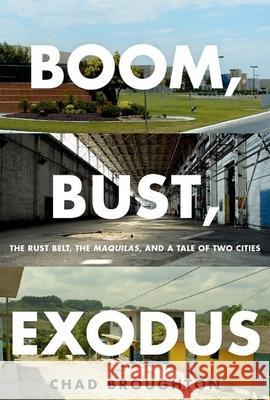Boom, Bust, Exodus: The Rust Belt, the Maquilas, and a Tale of Two Cities » książka
Boom, Bust, Exodus: The Rust Belt, the Maquilas, and a Tale of Two Cities
ISBN-13: 9780199765614 / Angielski / Twarda / 2015 / 408 str.
In 2002, the town of Galesburg, a slowly declining Rustbelt city of 34,000 in western Illinois, learned that it would soon lose its largest factory, a Maytag refrigerator plant that had anchored Galesburg's social and economic life for decades. Workers at the plant earned $15.14 an hour, had good insurance, and were assured a solid retirement. In 2004, the plant was relocated to Reynosa, Mexico, where workers spent 13-hour days assembling refrigerators for $1.10 an hour. In Boom, Bust, Exodus, Chad Broughton offers a ground-level look at the rapid transition to a globalized economy, from the perspective of those whose lives it has most deeply affected. We live in a commoditized world, increasingly divorced from the origins of the goods we consume; it is easy to ignore who is manufacturing our smart phones and hybrid cars; and where they come from no longer seems to matter. And yet, Broughton shows, the who and where matter deeply, and in this book he puts human faces to the relentless cycle of global manufacturing. It is a tale of two cities. In Galesburg, where the empty Maytag factory still stands, a hollowed out version of the American dream, the economy is a shadow of what it once was. Reynosa, in contrast, has become one of the exploding post-NAFTA "second-tier cities" of the developing world, thanks to the influx of foreign-owned, export-oriented maquiladoras--an industrial promised land throbbing with the energy of commerce, legal and illegal. And yet even these distinctions, Broughton shows, cannot be finely drawn: families in Reynosa also struggle to get by, and the city is beset by violence and a ruthless drug war. Those left behind in the post-Industrial decline of Galesburg, meanwhile, do not see themselves as helpless victims: they have gone back to school, pursued new careers, and learned to adapt and even thrive. In an era of growing inequality and a downsized middle class, Boom, Bust, Exodus gives us the voices of tho











